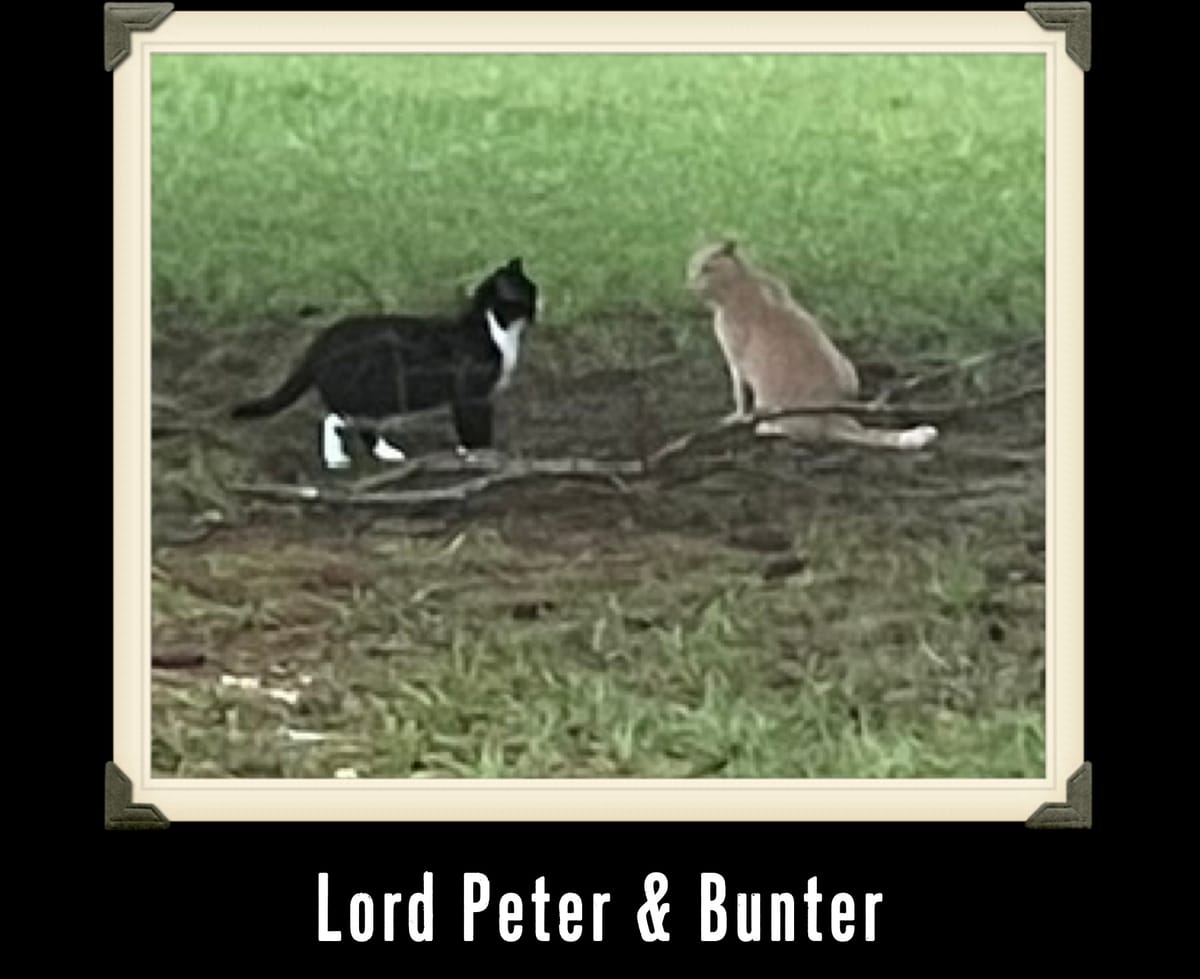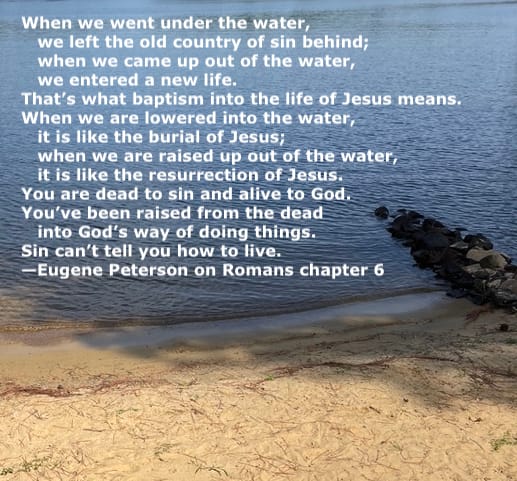3 Drownings & 3 Faiths in Luke 16.19 to 17.10
He designed a tree that would serve Jesus not as a strawman that is easily blown down, but as a formidable target — not unlike God’s creation of Goliath.

Joni
When I was 8 years old, my grandmother took me to see the Joni biopic. It opens up with the scene of her diving accident and then spends the next 100 minutes detailing her ordeal of life as a quadriplegic.
I was literally traumatized.
Shortly thereafter, my grandparents signed me up for swimming lessons at the local YMCA. . . . I guess they had no clue how the Joni movie had affected me.
Every second of the drive to the first class, every second in the locker room, every second standing on the cold tile floor listening to the coach drone on with instructions — the scene of Joni's accident was on instant replay.
I could hardly get in the pool. And at one point, before I knew what was happening, I was under water — I couldn't breathe, I was swallowing water, I didn't know which way was up, and I was wondering: Why is no one pulling me out?
I made it through the first class and perhaps half of the next, but then my grandfather — very uncharacteristically — let me quit.
It wasn’t until after college that one day my best man patiently helped me learn how to swim. I trusted him. And he helped me conquer my fear.
Three Drownings
Jesus exhorts us to consider 3 drownings and 3 times when people should have faith, in last week's and today's assigned Gospel readings:
1st Drowning
The first drowning — so to speak — comes at the end of chapter 16:
Narrator/Jesus: “The rich fellow died and was buried and found himself in the place of the dead. In his torment, he looked up, and off in the distance he saw Abraham, with Lazarus in his embrace.” . . .
Abraham: “Son, . . . a great canyon separates you and us.” . . .
—Luke 16.22–26 (Voice)
So, here we see that the rich man has to look up past a great chasm — which means he is down in the abyss where he is drowning in thirst and torment.
2nd Drowning
The second drowning comes at the beginning of Luke 17 where we hear Jesus describe the evil person, who makes others stumble, will himself drown in the sea:
“a millstone put around his neck and to be hurled into the sea”
—Jesus in Luke 17.2 (TLV)
3rd Drowning
And then Jesus introduces us to the Black Mulberry tree which, I'm told, grows to about 22-feet high and has a vast root system enabling it to live for hundreds of years.
So, here’s one in London, planted as late as 1612 — so that makes Mildred look like a newborn!

And if you think that's impressive, here’s one in Kosovo planted as late as 1272 — that’s over 750 years old!

These are durable trees that will outlive 20 generations of people.
When God created the Black Mulberry tree, he knew what he was doing. He designed a tree that would serve Jesus not as a strawman that is easily blown down, but as a formidable target — not unlike God’s creation of Goliath.
So, when Jesus says:
“If you have faith like a mustard seed, you could say to this mulberry tree, ‘Be uprooted and planted in the sea,’ and it would obey you.”
—Jesus in Luke 17.6
—he’s talking about something that in the natural world according to science and reason, should never happen. The most entrenched trees are not used to being uprooted and drowned in the sea.
Like the Rich Man who is used to getting his way and who thinks he can afford to ignore Lazarus-the-beggar at his gate, and like the Evil Persons whom the village fails to rebuke and fails to sacrifice the village millstone in order to stop them in their tracks — the Black Mulberry tree is used to getting its way.
Having Faith — or not — Three Times
And yet, against intractable forces, Jesus calls us to have a trusting faith, three times in these passages:
1st Having Faith — or not
Rich Man: “Please, Father Abraham, I beg you, send Lazarus to my father’s house. I have five brothers there, and they’re on the same path I was on. If Lazarus warns them, they’ll choose another path and won’t end up here in torment.” . . .
Abraham: “They already have the law of Moses and the writings of the prophets to instruct them. Let your brothers hear them. . . . If they’re not listening to Moses and the prophets, they won’t have trust even if someone comes back from the dead.”
—Luke 16.27–31 (Voice, alt.)
Now, most of our translations, instead of saying, "they won't have trust" say something like, they won't be convinced or they won't be persuaded, but the word there is the same verb that can be translated as having trust.
Jesus says if we have a trusting faith in the written revelation entrusted to the Jewish people, then:
• we will know how to say N-O to the powerful temptations of riches, and say Y-E-S to the beggars on the other side of our wall
• we will avoid being thrown down the chasm of death
• and we will welcome the more radical revelation of the resurrected Messiah
— which is exactly what the emissaries are asking for when they command Jesus to:
“Increase our trusting faith.”
—the 12 apostles in Luke 17.5
because:
• some of them have difficulty saying No to money
• some of them are worried about Judgment Day
• and some of them aren’t sure that as they get closer and closer to Jerusalem and Jesus talks more and more about his death and resurrection — not to mention the imperative for them to suffer — they’re not sure they have the kind of faith Jesus expects of them for the days ahead.
So we might easily enough find ourselves with the 12, imploring Jesus to “Increase my faith, Jesus!”
2nd Having Faith — or not
To which Jesus says:
“If you have faith . . . you could say to this [un-movable] tree, ‘Be uprooted and planted in the sea,’ and it would obey you.”
—Jesus in Luke 17.6 (TLV)
Now, Bible scholars want you to notice something here: There’s prevenient obedience:
“The tree was ready to obey before the command was given!”
—Darrell Bock
But in order for that obedience to happen:
“To uproot sin requires that the apostles speak out.”
—Ben Witherington
If we don’t trust to put our faith into action — or at least into words — that which is otherwise im-movable has no reason to budge, even if it’s ready to do that.
3rd Having Faith — or not
To illustrate this parable about having faith and putting it into action, Jesus tells another parable about having a dutiful servant.
It’s kind of like our tuxedo cat Lord Peter and his neighborhood pal whom we call Bunter — because of Dorothy Sayers’ characters Lord Peter and his valet (or butler) Bunter. Lord Peter is clearly in charge — he was, after all, a captain in Word War I and Bunter was his dutiful sergeant, and that relationship continued after the War.
Can you imagine having your own sergeant or butler but just letting them sit around twiddling their thumbs and doing whatever they wanted to do?
Jesus’s point is that the dutiful servant = the obeying mulberry tree that submits to the faith-filled, authoritative command to be uprooted and thrown into the sea — just like the rich man must go where he is sent, to the place of the dead.
Summary
Three Drownings
So, we have the 3 drownings:
1. the Rich Man in the Place of the Dead/Chasm
2. the Evil Man in want of a millstone in the Sea
3. the Uprooted Tree in the Sea
Three Faiths — or lack thereof
And the exhortation to Have a Trusting Faith 3 times:
1. a trusting faith that lifts people out of deathly circumstances through self-sacrificial generosity — like Moses and the Prophets taught us — which anticipates how Jesus’s resurrection will lift us out of Death
2. a trusting faith that speaks against what must be moved
3. a trusting faith that exercises the mantle of Christ in the service to Christ
Faith
Craig Keener says that:
“Faith grows as one uses it as a servant; its end is service, and it is never an end in itself.”
—Craig Keener
Here’s my Costco Card with my name and picture on it. Having this card in my wallet is not the end goal of joining Costco. If this thing just stayed in my wallet all the time and I never used it — I never went to Costco to get my big discounts and my $1.50 foot-long all-beef American hot dog with a soda to boot — it would all be for naught if I didn't get this out of my wallet and use it.
—Craig Keener
Jesus calls us to a radical Faith. Jesus calls us to a Faith that stretches us. Jesus doesn’t bother inviting me to do something that I can do while I’m sitting on the couch eating supper and watching a movie with Nancy. The Enemy specializes in those kind of easy invitations . . . not Jesus.
Jesus invites us into costly enterprises that demand our confidence and courage; demand us to speak up, demand us to say something and to do something.
Let’s use these lyrics as our affirmation of faith:
In you, Lord, is our faith; and we shall not believe in vain
For Christ is first among the resurrection of the slain
Yet some of us deny the dead can raise to life again
Were this the case, then Jesus’ bones the tomb would still contain
And we would be most pitied for the faith we’d have to feign
A certain mind may think belief is only in the head
That learning happens chiefly when The Word is heard or read
Belovèd, this is not the way our Savior preached and led
To Jesus and his followers belief and action wed
And so his brother James knew faith apart from works is dead
Now we behold in wonder this mysterious motif
That Christ has died, is risen, and is coming like a thief
To break into our prison home and take away our grief
The doubt-filled and tormented mind may fin’lly find relief
This we believe with all our heart; Lord, help our unbelief
—"Faith" lyrics by Ryan Flanigan from Three Gifts by Liturgical Folk 2024




